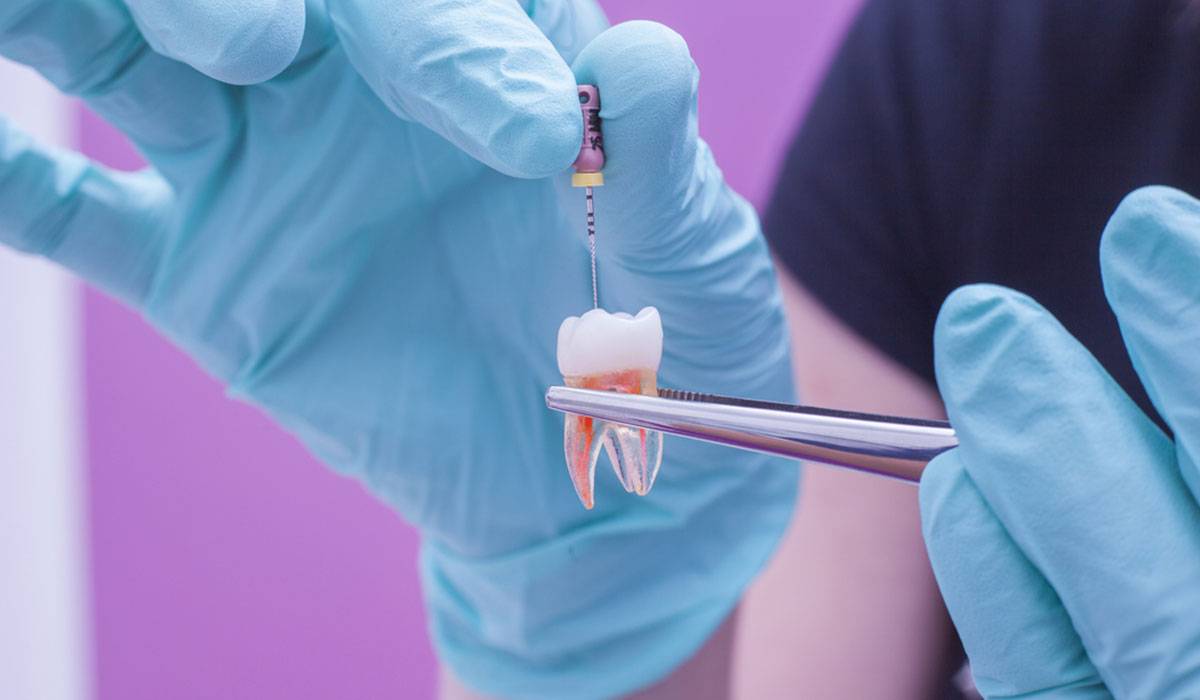Prices for Root Canal Treatment vary significantly and largely depend on many distinct and important factors that can make them different from one person to another and from one place to another. In the following article, we will explain these factors, in addition to many other distinctive factors that we will get to know in detail, so follow us so that we can answer all your questions in this regard.

Root Canal Treatment Prices
Root Canal Treatment Prices
It is important to know that root canal prices are usually varied from one place to another and from one person to another, and this matter can cause a lot of difference in prices, and this is due to the presence of many factors that control root canal filling prices to a large extent, and the following are the most prominent of these prices as follows:
- The cost of root canal treatment in Egypt ranges from 1000 EGP to 1500 EGP.
- The cost of root canal treatment for front teeth in Egypt ranges from 800 EGP to 1200 EGP.
- The cost of a regular tooth filling in Egypt ranges from 500 EGP to 700 EGP.
We will work with you step by step to ensure you get the ideal results and the beautiful smile you desire. Do not hesitate to visit us to inquire about our services and learn more about laser tooth filling prices. We are The Dental Center at your service!
Laser Tooth Filling Price
Laser is considered one of the latest and most important modern technologies that have been developed for filling teeth and cavities, and it is a distinctive matter that, despite its outstanding results, its prices vary greatly from one place to another and from one doctor to another. Here are the most prominent differences as follows:
- Laser filling for a single tooth may range from 500 EGP to 700 EGP.
- Cosmetic veneer treatments for teeth may range in price from 800 EGP to 1000 EGP. For more information, read the following article.
Root Canal Price 2023
Many specialized dental care centers offer various offers and advantages to attract many people seeking dental treatment and root canal treatment in particular. In this regard, we present you with the most prominent prices that include root canal treatment, which are as follows:
- Root canal treatment costs from 1000 to 1500 EGP.
- Root canal treatment for children costs from 600 to 800 EGP.
- Root canal treatment for teeth costs from 900 to 1200 EGP.
Price of Wisdom Tooth Root Canal
There are many distinctive factors that affect the cost of wisdom tooth root canal treatment. If the wisdom tooth is in its proper position and follows the alignment of the preceding teeth, it may cost 1000 to 1200 EGP for its filling.
On the other hand, the dentist makes the decision to extract if the tooth is in poor condition or its position does not allow for filling. In other cases, wisdom tooth filling may be easy, and its filling cost is not high, of course.
Is Root Canal Treatment Allowed for Children?
Yes, root canal treatment can be performed for children in cases where the nerve in the primary or permanent teeth is damaged or inflamed, as root canal treatment is a common and effective procedure for treating nerve inflammation and preserving the affected tooth. Root canal treatment cases for children require special care and consideration for their individual needs and dental development. There may be differences in treatment techniques or the use of materials suitable for treating primary teeth compared to permanent teeth. The dentist should carefully evaluate the case and make an informed decision based on the child’s individual situation.
Additionally, regular follow-up care for dental health in children and adherence to good oral hygiene and regular visits to the dentist are crucial. The attending dentist should be consulted for proper guidance and personalized consultation for the child’s individual case.
Root canal treatment in children is considered a safe and effective medical procedure for treating teeth with nerve damage. However, there are some potential risks or side effects that should be considered when performing root canals on children. Some potential side effects include:
- There may be some allergic reactions to the filling materials used in root canal treatment, so any previous sensitivities should be checked to avoid using materials that cause allergies.
- An infection may occur in the treated tooth after the root canal procedure, which may require additional treatment. This can happen if the root system is not properly cleaned or if bacteria leaks at a later time.
- Damage to the surrounding tissues may occur during the root canal procedure, especially if there is a need to remove a large cavity or repair tooth damage. However, these cases are rare and are handled with care during treatment.
- Discoloration of the treated tooth may occur due to the materials used in the root canal, and a dark color or stain may appear on the tooth, but this is rare.

Side Effects of Root Canal Treatment for Children
How Many Sessions Does Root Canal Treatment Take?
The number of sessions required for root canal treatment depends on several different factors that can have a significant impact on the treatment and varies from patient to patient, including the following:
- If the affected tooth has multiple roots or poses a greater challenge in accessing the root system, the treatment may take more sessions.
- If there is severe inflammation or infection in the tooth, additional treatment may be required before starting the actual root canal, thereby increasing the number of required sessions.
- Some dentists may require multiple visits to complete the root canal procedure due to the need for additional preparations or the preparation of special materials.
Therefore, as mentioned above, root canal sessions can range from one to three sessions and in many cases more, depending on each patient’s condition and different needs.
Does Every Root Canal Need a Crown?
No, not every root canal case requires a crown or cap. The use of a crown depends on the condition of the tooth and the surrounding teeth. In some cases, after root canal treatment, the tooth may be strong enough to maintain its function without the need for a crown. However, in many cases, a crown is installed after root canal treatment to strengthen the treated tooth, prevent it from breaking, and protect it from decay or fracture. The decision to use a crown depends on several factors, including:
- The size and location of the treated tooth.
- The condition of the surrounding tissues.
- The ability of the tooth to withstand biting and chewing forces.
- The dentist makes a decision based on a comprehensive assessment of the case and the patient’s needs. Therefore, it is advisable to consult your dentist to determine if your case requires a crown after root canal treatment.
What is an Alternative to Root Canal Treatment?
In cases where root canal treatment may not be the optimal or possible option, other alternatives may be suggested to treat the nerve problem in the tooth. Some possible alternatives include:
- Nerve Removal: In this procedure, the inflamed or damaged nerve is removed, and the root system is cleaned, but without filling the nerve with a filling material. Instead, special disinfectants are applied to help kill bacteria and sanitize the roots. This procedure may be used temporarily before a final root canal treatment.
- Dental Implants: Dental implants heavily rely on solving all the problems and defects that may appear in the natural tooth, which the artificial tooth can eliminate and end in the shortest possible time.
- Tooth Extraction: If root canal treatment is not possible or if successful results are not obtained after root canal treatment, the extraction of the affected tooth may be suggested. These options include replacing the extracted tooth with an implant, bridge, or dentures.
“At our The Dental Center, we take care of you and your teeth, and we strive to protect them from decay and damage. Make an appointment now and benefit from the advantages of advanced technology. Visit our website through the following link!”

What is the Alternative to Root Canal Treatment?
After undergoing root canal treatment and root canal filling, some temporary and transient symptoms may appear. Here are some common symptoms that may occur after root canal treatment:
- Temporary Pain: The patient may experience temporary pain in the first few days after treatment. This pain can be mild to moderate and will gradually subside over time.
- Sensitivity to Pressure: The patient may experience sensitivity to pressure on the treated tooth, meaning they may feel pain when chewing food or consuming hot or cold beverages. This sensitivity may subside over time.
- Swelling and Redness: Mild swelling and redness may occur in the area surrounding the treated tooth. This condition may be temporary and disappear on its own within a few days.
- Appearance of Cold or Heat: The patient may feel a change in temperature in the treated tooth, where it may appear unusually cold or hot to the touch. This is considered a transient condition and may last for a short period.
Root canal treatment, also known as root canal therapy, is a medical procedure aimed at treating and saving a tooth affected by nerve damage. Although root canal treatment is considered a safe and common procedure in dentistry, it can cause some side effects or complications in rare cases, which may include some potential side effects:
- An infection may occur after root canal treatment, requiring additional treatment to eliminate it. This can happen if the root system is not adequately cleaned, or if bacteria leaks after the treatment.
- Damage to the surrounding tissues, such as the gums or bone, may occur during the root canal procedure. However, this type of damage is uncommon and is handled with care during treatment.
- Some allergic reactions may occur to the materials used in root canal treatment, such as the filling material. If the patient has a known allergy to any component in the materials used, alternative materials may need to be used.
- In some cases, it may be impossible to remove the root canal instruments from the root system, requiring additional procedures to address this issue. These cases may require surgical intervention to remove the stuck instruments.
Here are some of the instruments used in root canal treatment in dentistry:
- Suction Tip: Used to remove saliva and excess materials during the procedure.
- Pliers and Files: Used to access and shape the root system and enlarge it. Different sizes and shapes of pliers and files are available to fit the dimensions of the roots.
- Rubber Mallet: Used to gently displace and soothe the gum tissues during the insertion of files into the root system.
- Root Cleaning and Flushing Tools: Includes tools such as needles used to disinfect and flush the root system with disinfecting solutions.
- Temporary Filling: Used to seal the temporary opening after an initial root canal treatment.
- Filling Material: Used to fill the root system after removing the nerve. It can be a regular filling material like gutta-percha or advanced materials like resin-based sealers or light-cured biopolymers.
- Root Canal Filling: After cleaning and preparing the root canal system, the gap formed is filled with a filling material to prevent infection spread.
- Cavity Closure: The gap created in the tooth is closed using either a temporary filling material or a permanent filling material such as amalgam filling or crown to protect the tooth and restore its function.
It’s important for the patient to follow the treating dentist’s instructions after the nerve filling procedure, including mouth care, good hygiene, and regular follow-up visits.
Difference Between Nerve Filling and Regular Filling
Nerve filling and regular filling refer to two different procedures performed in the field of dentistry, and here’s the difference between them:
Nerve Filling (Root Canal):
- Performed when the nerve in the tooth is significantly damaged or experiences acute inflammation.
- Aims to remove the affected nerve and clean the root canal system in the tooth.
- The root canal system is filled with a strong filling material to prevent infection spread.
- The procedure may require multiple visits to the dentist, where root canal treatment is done in one visit and the filling material is placed in a subsequent visit.
Regular Filling:
- Performed when there is decay in the tooth affecting the outer hard tissues (enamel and dentin) but hasn’t reached the nerve.
- The decay is removed, and the tooth is cleaned from the damaged tissues.
- The gap resulting from decay removal is filled with a filling material to prevent further decay development and restore the tooth’s natural shape and function.
- Regular filling can be done in one visit to the dentist unless there is a large or deep decay requiring an additional session.
“Oral health is the gateway to overall health, and at our The Dental Center, we ensure excellent care and attention to every detail. If you’re experiencing nerve problems, we have perfect solutions to provide comfort and healing for you.”
https://youtu.be/TKupH9QiTWI
"Professional Dentist at the Dental Care Medical Center
Welcome to the Dental Care Medical Center, where we offer a full range of preventive, therapeutic, and cosmetic dental services. We have a team of the best dentists in Egypt, who have extensive experience in all areas of dentistry.
Extens ... read more
We are always happy to answer your inquiries


